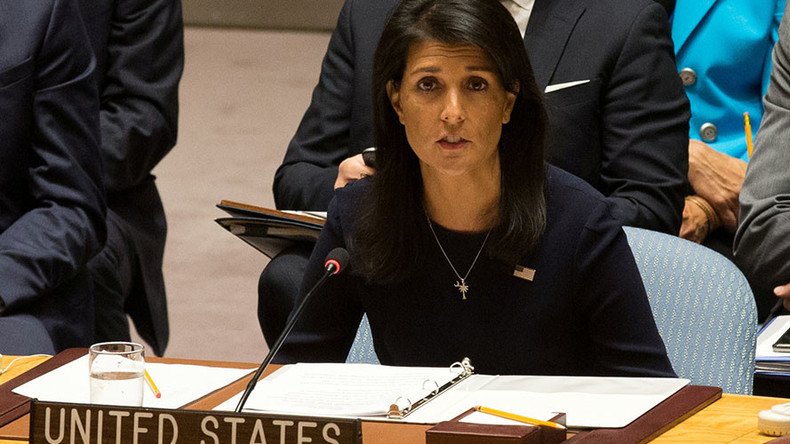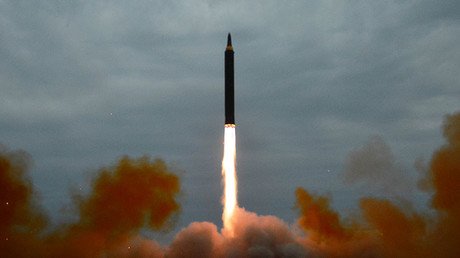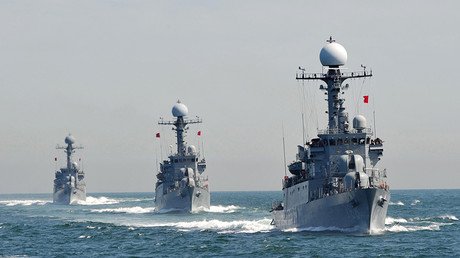‘US, N. Korea need to grow up & stop saber-rattling with nuclear weapons’

US officials should be on a plane right now to Pyongyang in a bid to lower tensions, says Eric Sirotkin, co-founder of the National Campaign to End the Korean War. Professor Joseph Cheng also joins the discussion.
In an emergency UN Security Council meeting, US envoy Nikki Haley said diplomacy is failing with North Korea, after the country carried out an underground hydrogen bomb test on Sunday.
"Despite our efforts, the North Korea nuclear program is more advanced and more dangerous than ever," Haley told the council on Monday. "War is never something the United States wants. We don't want it now. But our country's patience is not unlimited."
Moscow has called for a non-military resolution to the mounting tensions.
“We call for the international community not to be ruled by emotion, but to approach the situation in a calm and balanced manner,” said Russia’s representative at the UN, Vasily Nebenzya, during Monday’s meeting in New York.
The escalating tensions on the Korean Peninsula is being discussed by leaders at the 9th BRICS Summit being held in Xiamen, China.
RT: It appeared to end in a deadlock, as the US dismissed possible plans for de-escalating the crisis. Why do you think the US rejected the plan for dialogue, put forward by Russia and China?
Eric Sirotkin: It is befuddling to Americans and to the whole international community as to why at this point and time we would declare that discussions and dialogue have failed when we have never gone into discussions in so many years. And that they have been asking sit down with the US. I cannot understand why we don’t have US officials on a plane right now to Pyongyang to lower tensions. It seems like a simple task and a step to take.
RT: Do you think a plane loaded with American diplomats would be well-received by Pyongyang?
ES: Yes, they have said all along that they would be willing to discuss even the nuclear issues if the hostile US policy was worked out. Look, in 1953 we signed an armistice agreement with them promising several things. One that we would leave Korea, and two, that we would never introduce new weapons into Korea. The US imported more than 600 nuclear weapons over the years – took them taken out in the early 1990s, and now we are talking about reinserting nuclear weapons into Korea. This is a step backward, rather than a step forward. We need clear eyes to look at this, to approach this, to listen to dialogue to apply mediation-type principals, and get off your high horse and stop threatening the use of force and nuclear weapons on both sides, which is a violation of international law. There is no military solution to this conflict… This is a crisis that is escalating because the US is not willing to talk and engage. They believe the underground testing of nuclear weapons by North Korea is illegal when in actuality it is not, but the threat of using them is, and that threat is coming from both sides right now, and that needs to stop and they need to grow up.
'US not ready to talk'
Joseph Cheng, Professor, professor at Hong Kong City University
RT: Vladimir Putin has just said the hysteria around North Korea may lead to a global catastrophe and stressed, among other leaders at the summit that the North Korea crisis should be settled through peaceful means. How do you expect the situation to develop?
Joseph Cheng: At the moment we do not see any breakthrough, and President Putin is certainly right, and I think the Chinese leadership is in full agreement with him. He is probably more straightforward because he values good relations with the US less than Beijing.
The US is unwilling, or unable to pay the price for regime change in Pyongyang, and this has been made clear by the US Secretary of State Rex Tillerson, as well as by the South Korean president. A surgical strike against the military facilities in Pyongyang in North Korea is possible, is feasible, but extremely risky, because there are a lot of artillery and short-range rockets and so on, aiming at Seoul in South Korea along with the inter-Korean borders.
At the moment, the Trump administration is certainly not ready to sit down and talk, and satisfy Pyongyang's demands concerning cessation of hostilities, meaning diplomatic relations between the US and North Korea and an agreement not to attack North Korea, as well as foreign aid.
RT: Is President Putin right to think it is ridiculous to put Russia on a sanction list with North Korea, and then ask to unite on imposing sanctions against it? Is it something you would agree with?
JC: I guess so. Certainly the Trump administration has not been offering sufficient incentives to the Putin administration to induce cooperation between the US and Russia in handling various global crises. The ‘America First’ kind of attitude on the part of the Trump administration will not help in getting support from China, nor from Russia, especially.
Kim Jong-un begging for war, US patience not unlimited – US envoy to UN https://t.co/63yp5FopXDpic.twitter.com/P5mtpouDQI
— RT (@RT_com) September 4, 2017
RT: The Russian President remarked that the North Korean people would rather ‘eat grass than abandon nuclear weapons tests.’ What do you make of that statement?
JC: The North Korean regime, as well as the people, understand that there is a definite threat from the US, and they see that threat as real. At this stage, and in fact, throughout all the all previous decades, the North Korean regime has been able to mobilize the people, to make sacrifices, and spent a lot on national defense, rather than on economic development. At least the regime has been able to maintain its stability throughout the years. This may not be rational from the international community’s point of view, but apparently, the North Korean government manages to convince its people to support this kind of policy.
#Putin: N. Korea will not drop nuclear programme unless it feels secure (WATCH LIVE) https://t.co/fEdQafGVxkpic.twitter.com/4wTzqeZdNx
— RT (@RT_com) September 5, 2017
'Global rivalry is thwarting peace effort'
Rene Carayol, political analyst & author
RT: It looks like there's an impasse now over the Korean crisis. What comes next, do you think? Can it still be peacefully resolved?
Rene Carayol: We must always believe that it can be. But this is brinkmanship of the worst sort. What we can’t seem to separate is the global rivalry of big three: Russia, China, and America. That seems to be getting in the way. At this moment we’ve got the lone wolf of North Korea. Everybody else needs to be aligned and hunt in packs. It is through that alignment, through that collaboration, then we could see a change in circumstances. But it is all getting a little bit too muscular. I think it is a global rivalry that is getting in the way of an alignment.
RT: Why has Washington been so dismissive of the plan proposed by Russia and China?
RC: Because it was proposed by Russia and China. I wonder if that was proposed by, let’s say, Germany, France, and the UK, whether they’d be so dismissive? I doubt it... This unchartered territory for everyone; I’m not sure we need more gambling. We need cool heads and collaboration.
The statements, views and opinions expressed in this column are solely those of the author and do not necessarily represent those of RT.














